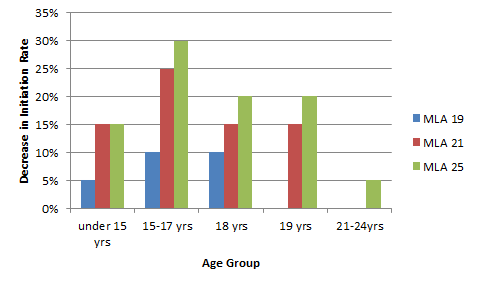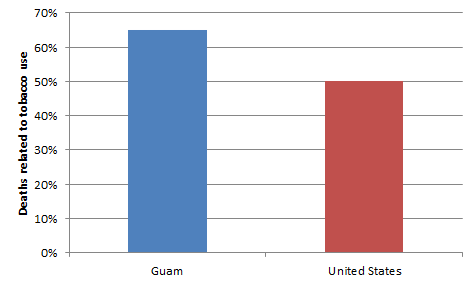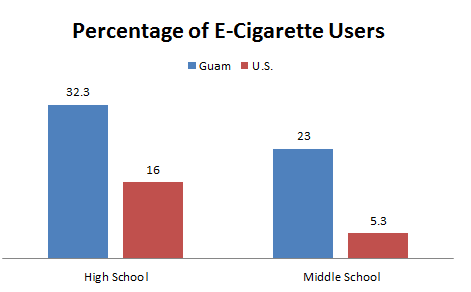Bill 9-34
The Guam Legislature proposed Bill 9-34 to raise the legal age of tobacco use on Guam to 21 years. Known as the Youth Protection Act of 2017, it was later lapsed into law on Mar 23, 2017 by Gov. Eddie B. Calvo. As such, the law takes into effect on Jan. 1, 2018.
By the numbers, Guam ranks the highest in smoking among young adults. According to Cathy Rivera Castro of the American Cancer Society Guam Chapter, “Guam’s youth smoking rate is 17.6 percent, and the national average is at 10.8 percent. One in three of Guam’s high school students, and one in four middle school students, uses electronic cigarettes.”
But what’s so important about raising the legal age of tobacco use to 21 years? What are the benefits? Issues on the passing of Bill 9-34 have generated some ambivalence among some of Guam’s residents. Yet, the lapsing of this law is better because it promotes a healthier lifestyle for Guam’s future.
Support
Making the legal age of tobacco use to 21 years has raised issues among the citizens of Guam. Individuals such as Speaker BJ Cruz and support Bill 9-34 because of the health benefits it promotes.
Speaker BJ Cruz, stated that it was a win against Big Tobacco after the bill was lapsed into law. He added that it was not about money but about preventing the future generations from disease and death from tobacco use.
In an interview with KUAM, the executive director of the Guam Cancer Care, Terry Cuabo, mentioned that it was the right thing to do. He noted that he understands the opinions of those who opposed the bill. However, he said that the bill was aimed to save lives, which would benefit the community
According to the Institute of Medicine (2015) lowering the initiation rate of tobacco use can be correlated with increasing the legal age of tobacco use. Their study shows that youth 15-17 years are the most affected if the legal age is raised.

Based on Figure 1, making the legal age of tobacco use to 21 years decreases the initiation rate on youth 15-17 years by 25 percent. That is 15 percent higher than raising the legal age to 19 years.
The committee of the Institution of Health concluded that raising the legal age to 21 would also have health benefits among youth. There will be a reduction in the side-effects of smoking and the deaths caused by smoking.
Data
Catherine Rivera Castro, a representative of the American Cancer Society Cancer Action Network, provided documents that show the numbers of tobacco use in Guam.
Guam is actually ranked #1 of having more than 17 percent of youth who smoke. Also, 65 percent of deaths were related or worsened by tobacco use. These numbers are alarming compared to a lower average in the United States of having around 50 percent (Figure 2). In addition, 1 in 5 high school students and 1 in 10 middle school students in Guam currently smoke.

Indeed, an Institute of Medicine in 2015 predicted the benefits of raising the age to 21 years. First, there would be 4.2 million fewer years of life lost for those born between 2000 and 2019. Second, tobacco use prevalence would fall an estimated 12 percent compared to 3 percent if it was raised to 19 years. These predictions, if accurate, indicate that the health of youth of Guam would benefit when the smoking age is raised.
E-Cigarettes
E-Cigarettes are battery-operated devices made to resemble cigarettes that deliver a nicotine containing aerosol. E-cigarettes have many names such as e-cigs, hookah, vapes, or mods.
Dr. Annette David, the chair of Guam’s State Epidemiological Outcomes Workgroup (SEOW), mentioned that electronic cigarettes are popular among youth. She added that e-cigarettes are not approved by the Food and Drug Administration.
The State Health Officer’s Report on E-Cigarettes stated that the number of teens who used e-cigarettes tripled from 1.5 percent in 2012 to 4.5 percent in 2013.
According to the Guam Youth Risk Behavioral Survey in 2015, 1 in 3 high school students and 1 in 4 middle school students currently use e-cigarettes.
From Fig. 3, the percentage of e-cigarette users on Guam is significantly higher than the United States. 32.3 percent of high school students and 23 percent of middle school students in Guam use it compared to 16 percent and 5.3 percent in the U.S.

Dr. David mentioned that since e-cigarettes are new, the youth adapted to these items and made them into a fad. Around 60 percent of youth on Guam have experimented with e-cigarettes. The number could be a result of the promotion of its harmless appeals.
“E-cigarettes come in many different flavors like bubblegum and cappuccino,” said Dr. David. The California Department of Public Health in their Health Advisory adds that the use of cartoons and fashion accessories promotes them to younger audiences.
Harms
Even with the so-called harmless appeals, e-cigarettes also contain nicotine, which is a harmful neurotoxin. It also contains other carcinogens such as formaldehyde, acetaldehyde, and benzene. The nicotine is in a liquid form and exposure to it can harm brain development among youth.
Smoking e-cigarettes also emit toxic chemicals in the form of an aerosol. At least 10 of the chemicals in the aerosol are on California’s Proposition of 65 list of chemicals known to cause cancer and other harms.
A risk present in e-cigarettes is the explosion of the device. Several cases have surfaced in which e-cigarettes have exploded and caused damage to its users.
An instance of an exploding e-cigarette in Guam had a user suffer severe trauma to his face, hand, and eyeball. The surgeon, Dr. Ng, said in an interview with KUAM, that the user’s eye was severely damaged.
In 2008 – 2012, lung cancer accounted for 15 percent of new cancer cases and was responsible for almost one-third of cancer deaths in Guam. These numbers could potentially decrease when the legal age is raised to 21.
Advocacy
Speaker BJ Cruz, Ms. Catherine Castro, and Dr. Annette David pushed for Bill 9-34, which will the legal age of tobacco use in Guam to 21 effective Jan 1, 2018. The bill also recognized e-cigarettes as tobacco products so those under 21 cannot purchase e-cigarettes.
Ms. Castro met with each senator of the 33rd and 34th Guam Legislature to advocate the smoking bill. Even with the bill passing in the Legislature, she mentioned that she continued to petition for it.
With a high number of youth who use e-cigarettes, Dr. David still feels that more policies could be proposed to significantly lower the number of users. She mentioned policies such as no vaping in public places and placing higher taxes on tobacco products could help.
A key factor in the future success of the bill is how strongly it will be enforced in Guam. If it is not enforced, Guam may experience an increase in youth smokers and issues of its adverse effects.
Raising the legal age of tobacco use to 21 years is the right step for a positive change. The number of smokers on Guam may decrease which means fewer youth smokers. There may be less cases of lung cancer deaths.
Dr. David mentioned that Guam as a community needs to work together to inform people about the risks of cigarettes. Raising awareness and mobilizing support might lower the number of cigarette users in the future. This can prevent the youth from developing the adverse side effects of using cigarettes.
People may continue to oppose this change. But if the island experiences the positive effects, then the change will not be as bad as they thought. The change will be for a better Guam.

